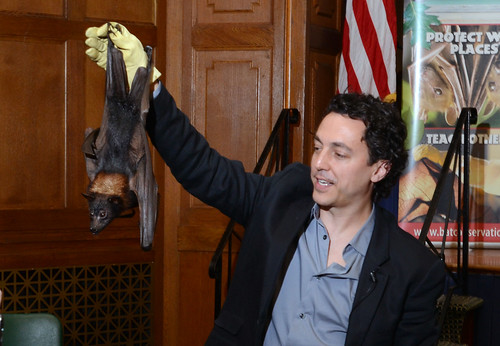Consider the bat - you know, the flying type that swoops out of urban eaves or rural caves usually at dawn or dusk. What do you know about the central roles they play in controlling insect populations, balancing ecosystems or pollinating flowers, fruits and vegetables?

Last week, students in grades four through eight and educators from around the country did more than just consider the bat. They met a number of live bats via an hour-long Washington, D.C., Bats!LIVE distance learning seminar (view online video) including a little brown bat, a vampire bat and a straw-colored fruit bat with a six-foot wingspan. They asked questions of bat biologists, learned about threats to bats and what everyone can do to help bats in their own communities.
The event was part of a two-day USDA celebration of bats and bat conservation including an employee forum where experts from the Forest Service, the Natural Resource Conservation Service and partner organizations shared current agency initiatives and activities to help bats and address the devastating White-Nose Syndrome disease that is killing hibernating bats in eastern North America.
Susie Sullivan, who watched the webinar with her third grade class in Chicago, said the webinar scored a huge hit with the students. “The children were highly motivated to discover facts and background information from the website before the webcast,” she said. “The children had a choice to have lunch and recess as usual, or eat and watch the lunch-time webcast in the classroom - all chose to watch the webcast! You have inspired the children to excel.”
There are more than 1,200 species of bats – about one-fifth of all mammal species – ranging from the tiny bumblebee bat, the world's smallest mammal weighing less than a penny, to the giant flying foxes that have six-foot wingspans.
The webcast was part of BatsLIVE! A Distance Learning Adventure, a free education program aimed to bring the best of bat information and research to the classroom. The program is a partnership between the U.S. Forest Service and more than 18 other federal and state agencies, nonprofit organizations and the Prince William County, Va., public schools. The program uses a dynamic website, webinars and live webcasts to help children understand the value of bats in their lives, and the conservation challenges they face. BatsLIVE! is just one of the popular distance learning programs including PollinatorLIVE!, MonarchLIVE!, Winging Northward: A Shorebird’s Journey, and Migration Science and Mystery, which receive Forest Service support to provide online resources for teachers and students.
The BatsLIVE! Web site features in-depth bat information – such as the fact that more than two-thirds of bat species hunt insects and a single little brown bat can eat up to 1,000 mosquito-sized insects in just one hour. Also available are photos, lesson plans, and links to bat conservation partners and up-to-date information about White-Nose Syndrome.
The next BatsLive! webinar on Sept. 18 will broadcast a live educational event from Bracken Cave in Texas, the largest bat cave in North America which is home to more than 20 million Mexican Free-tailed bats. Each evening, they emerge from the cave in clouds that spiral up into the sky as they start their evening insect hunt. The broadcast will be the first live broadcast from Bracken Cave, and will feature leading bat biologists and educators. A teacher webinar on caves and karst will also be offered Oct. 11. Participation in these programs is free, and educators are encouraged to register for the programs at www.batslive.pwnet.org.
